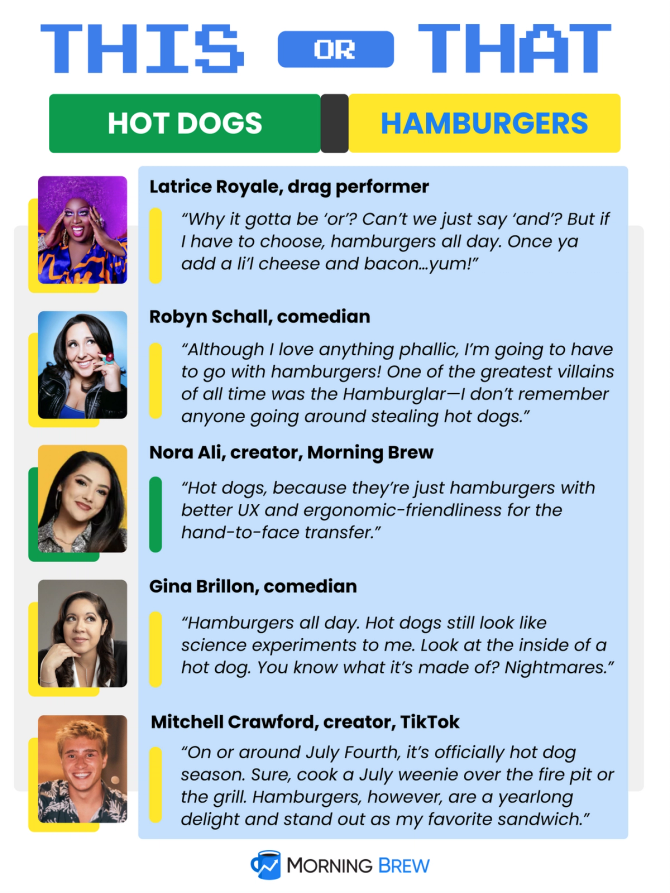| | | | | |  Kate Dehler | | IN THIS ISSUE | Planning your digital legacy | Memes for dark times | Astead Herndon launches a podcast | | | | "I first noticed there was ketchup dripping down the wall, and there was a shattered porcelain plate on the floor. ...The president...had thrown his lunch against the wall, which was causing them to have to clean up."—Cassidy Hutchinson, testifying before the House select committee investigating the January 6 attack "Please, m'lord, don't bang the plates."—a Medieval Times employee in New Jersey to rowdy guests (The employees are unionizing.) "Godspeed for women's rights."—Kendrick Lamar, closing Glastonbury | | | Credit: Twitter users @BetteMidler, @eyehatecops, @deadeyebrakeman On June 24, the Supreme Court eliminated the constitutional right to an abortion. The majority of Americans oppose the decision, but at least two people celebrated: Executives at the Global Center for Human Rights, an organization that vows to "uphold national laws that protect life, family, and freedom of religion," posed in front of the Capitol with wide grins and a poster that read, "We will adopt your baby." It's a phrase with a long history in the anti-abortion movement. One person sharing the photo on Twitter recounted this same offer was yelled at him and his wife while they were walking into a clinic to have an abortion for a nonviable pregnancy. The photo is uncanny and the "offer" is performative—all elements that make for a perfect satire. "We will adopt your baby" quickly became a meme devoid of any of this context. By June 25, the phrase was trending. Online posters flooded the zone with their own adoptive parent suggestions, enlisting characters like Wario and Waluigi, Hellraiser, the Beastie Boys, the trio of witches from the movie Hocus Pocus, and the burglars from Home Alone. Other meme-makers interpreted the setup with less joyful irony, using notorious abusers of children like Jeffrey Epstein and Ghislaine Maxwell. A programmer created a website that will generate a random stock photo of two people along with the phrase. Comedian Kylie Brakeman shared an impression of the "deranged people holding the signs," cycling through the surprisingly many different ways to demand a stranger's baby in just 34 seconds. This meme was probably the only funny thing to come out of a major Supreme Court decision that will negatively impact millions of people across the country. The court's three liberal justices warned that the recent decision would "jeopardize other constitutional rights." Justice Clarence Thomas wrote that foundational decisions like Obergefell v. Hodges—the landmark case that legalized gay marriage—should be reconsidered, and the ACLU said Roe's dismantling puts interracial marriage at risk. Tech experts expressed concerns that period-tracking apps could be subpoenaed for customer data, which could then possibly be used to locate people seeking an illegal abortion. Meanwhile, Facebook is banning users who say they will mail abortion pills within minutes of their posting. "We will adopt your baby" might make for a good laugh in a post-Roe world, but it's bound to be short-lived. —Ashwin Rodrigues | | |  —Interviews by Amanda Hoover | | | | | | In a world where 70% of women report they need clitoral stimulation to reach orgasm, Dame is stepping up. They're on a mission to close the pleasure gap by inviting people with vulvas to get in touch with their pleasure. Presenting The Dame Aer: The Aer's innovative design creates pulses of air and a soft seal, a combo that packs quite the orgasmic punch. Plus, the Aer is waterproof + rechargeable and comes with 5 different patterns + 5 different intensities—perfect for solo use or with a partner. Um, yes plz. Whether you're looking to jump-start your arousal or set a peak PR, go all the way with Dame. Take 15% off your first order with code MORNINGBREW. | | | | Kate Dehler There was nothing special about the Yahoo email account John Ajemian opened in 2002. It was identical to the many accounts the tech giant handed out for free—unremarkable. But Ajemian's account became the source of a nearly decadelong legal battle that raised a salient question: Who can access your digital accounts after your death? Ajemian died in a bicycle accident in 2006 at age 43. He didn't have a will, and his estate passed to his surviving brother and sister. As his siblings began sifting through his assets one by one, they realized that having access to Ajemian's email account would make their sad work easier. They asked Yahoo for access to the email account, telling the company that they wanted to use it both to identify Ajemian's assets and reach out to his friends, letting them know of his untimely death. Yahoo denied their request, citing the Stored Communications Act (SCA), a 1986 federal law that governs online privacy. The tech giant claimed that granting them access to the account would violate the SCA. Yahoo could keep Ajemian's siblings from accessing the account and the stored emails, it argued, and also it could even delete the emails rather than turn them over. Ajemian's siblings sued. The legal battle wound its way through the courts before the Massachusetts Supreme Court finally ruled in the Ajemians' favor in 2017. The case had broader implications, to the extent that an association representing major tech companies filed an amicus brief supporting Yahoo before the Massachusetts Supreme Court's ruling came down. But essentially the court found that the SCA didn't prevent tech companies from releasing emails to a "personal representative." What that means exactly is complicated, and raises another question: Do you even want your family to potentially read every DM or email you've sent? It's a question increasingly in need of answer, especially as the online record of lives are the digital legacies left behind, composed of assets that span everything from the sentimental to the financial and the mundane. That includes Instagram posts and photos, cryptocurrencies and NFTs, and credit card account logins. Some assets may seem trivial, but the need for a postmortem plan is heightened by the narrowing gap between the digital and physical selves: Family photos are stored in the cloud; "memories" fill social media, acting as online diaries; crypto wallets grow; and creative works may be password protected. They can all be lost, locked away from family if someone dies without leaving noted beneficiaries. "There's a whole new era of planning that we will actually have to do around our digital footprint," Sharon Hartung, author of the book Your Digital Undertaker, said. "We're going to have to define in the future if we want a virtual entity of ourselves to live into the future." Many may dismiss old drunken Finsta photos or tweeted memes as meaningless, but that's hard to argue considering we spend so much time online, and we build digital lives by creating or posting content. Traditional estate planning is largely ill-equipped to recognize the value of a digital self, and digital assets are creating fissures in the estate planning industry. Startups that offer services to specifically address stewardship of online accounts are filling that niche. They're guiding people in making decisions now about what happens to their data after they die, before it's too late, and before your family potentially gets to sift through your TikTok DMs. Finish reading this story by Amanda Hoover | | | The New York Times Astead Herndon is a political reporter whose voice you'll probably recognize if you've listened to The Daily from the New York Times. He has also contributed to CNN's political coverage, is good at Twitter, and has a really aesthetically pleasing apartment. Soon, he'll be hosting his own podcast with the Times focused on the midterm elections this fall. Herndon has described his vision for the upcoming pod as "a hub of nuance. A place where political junkies can learn something, yet the politically uninitiated will never be left behind. A show that is not afraid to wrestle with hard truths, but is not cruel." What's the best advice you ever received? My father always stressed the importance of hard work and not skipping steps in your development. He used to say, "No one goes to bed a blunder and wakes up a wonder." What's the most embarrassing song you'll admit to liking publicly? "MMMBop" by Hanson. What fictional person do you wish were real? Calvin Cambridge from Like Mike. What real person do you wish were fictional? Elon Musk and/or Jeff Bezos. In comics, rich guys going to space was way cooler. How would you explain TikTok to your great-grandparents? I'd explain the Voting Rights Act first. What always makes you laugh? This video of a guy singing a gospel rendition of The Golden Girls theme song. If you were given a billboard in Times Square, what would you put on it? I'd beg Rihanna for the album.
—Interview by Amanda Hoover
| | | | | | Mark(et) the moment: In this fast-changing world, you want the stock news you can actually use at your fingertips. With real-time data and expert insights, MarketWatch can help you navigate the volatility of today's markets and take action. Get 50% off one year for a limited time. | | | | Feel the need to treat yourself? This is how you can do it without feeling guilty. [Money Scoop] Sustainable materials are the future of fashion and these are the ones industry experts are most excited about. [Retail Brew] The carbon footprint of the tech sector is huge, accounting for 2%–4% of the global total. That's even bigger than aviation's. [Emerging Tech Brew] Advertising budgets can shrink during a recession, but abandoning advertising altogether can be risky for brands. [Marketing Brew] Speaking of a recession, in an uncertain economy, companies are less likely to think of their HR departments as executioners and more likely to consider them a stabilizing force. [HR Brew] Free money rocks: Which is why eToro gives you a *$10 bonus* if you deposit $100 into a new account (where you can invest in stocks, ETFs, and crypto). Don't miss out on this limited-time offer.* *This is sponsored advertising content. | | | | | | | ✤ A Note From eToro Securities trading through eToro USA Securities, Inc. Member of FINRA and SIPC. Crypto Trading through eToro USA LLC, not FDIC insured. |  | Written by Stassa Edwards, Amanda Hoover, Ashwin Rodrigues, and Sherry Qin Was this email forwarded to you? Sign up here WANT MORE BREW? Industry news, with a sense of humor → - Emerging Tech Brew: AI, crypto, space, autonomous vehicles, and more
- Future Social: the Brew's take on the world of social media
- HR Brew: analysis of the employee-employer relationship
- IT Brew: moving business forward; innovation analysis for the CTO, CIO & every IT pro in-between
- Marketing Brew: the buzziest happenings in marketing and advertising
- Retail Brew: retail trends from DTC to "buy now, pay later"
Tips for smarter living →  Podcasts → Business Casual, Founder's Journal, Imposters, and The Money with Katie Show Podcasts → Business Casual, Founder's Journal, Imposters, and The Money with Katie Show  YouTube YouTube Accelerate Your Career with our Courses → | ADVERTISE // CAREERS // SHOP // FAQ
Update your email preferences or unsubscribe here.
View our privacy policy here.
Copyright © 2022 Morning Brew. All rights reserved.
22 W 19th St, 4th Floor, New York, NY 10011 | | |
Post a Comment
0Comments